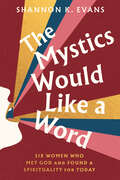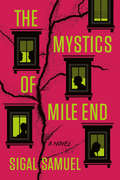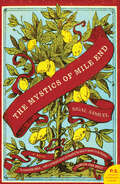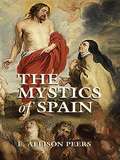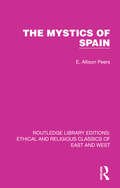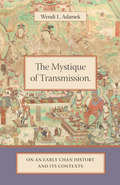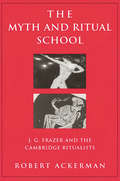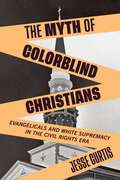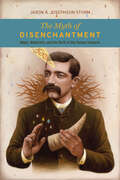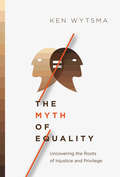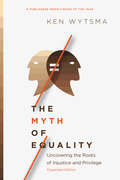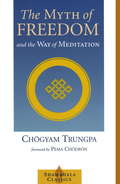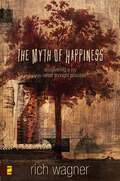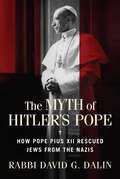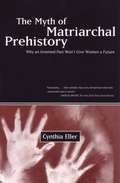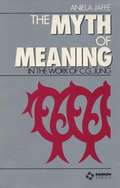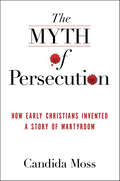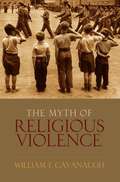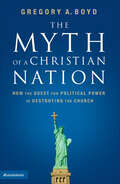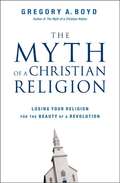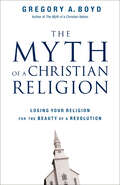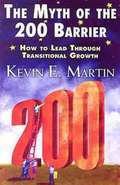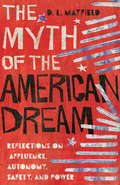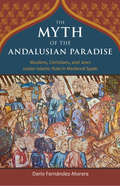- Table View
- List View
The Mystics Would Like a Word: Six Women Who Met God and Found a Spirituality for Today
by Shannon K. EvansDiscover a rich legacy of audacious women who forged a spirituality that is more inclusive, surprising, and empowering than we ever imagined.&“The feminist reading of women mystics I&’ve wanted for ages . . . invites us into the hopeful possibility for communal healing that we desperately need right now.&”—Sarah Bessey, bestselling author of Field Notes for the Wilderness and Jesus FeministIs there a Christian spirituality that embraces the entire reality of womanhood?The answer, Shannon K. Evans suggests, is an emphatic yes. There is a spirituality that meets us in every part of our lives, developed by the women who came before us. Six mystics—Teresa of Ávila, Margery Kempe, Hildegard of Bingen, Julian of Norwich, Catherine of Siena, and Thérèse of Lisieux—revealed a faith big enough to hold the female experiences of sex and desire, the yearning for bodily autonomy, the challenges of motherhood and identity, as well as life with male authority and—sometimes—violence. These women, self-determining, stubborn, and unapologetically themselves, asked questions in their time that are startlingly prescient today, and fought for women&’s experiences to be heard, understood, respected, and recognized as holy.In The Mystics Would Like a Word, readers will discover the story of Christian faith and spirituality as told by these extraordinary and wise women, one that speaks directly to today&’s unique experiences, and leads to wholeness, healing, and spiritual vitality.
The Mystics of Mile End: A Novel
by Sigal SamuelFour distinct voices weave together the tale of a dysfunctional Montreal family obsessed with climbing the Kabbalah’s Tree of Life. This literary debut by Jewish Daily Forward editor Sigal Samuel is reminiscent of Nicole Krauss’s The History of Love and Myla Goldberg’s Bee Season. The Meyer family lives in Mile End, home to a mashup of hipsters and Hasidic Jews, where down the street crazy Mr. Katz is building a tree out of plucked leaves, toilet paper rolls, and dental floss. When David, a skeptical professor of religion, is diagnosed with an unusual heart murmur, he becomes convinced that his heart is whispering divine secrets. But when David’s frenzied attempts to ascend the Tree of Life lead to tragedy, his daughter Samara, who abruptly abandoned religion years earlier, believes it is up to her to finish what she started. As Samara’s brother documents her increasingly strange behaviour, it falls to next-door neighbour and Holocaust survivor Chaim Glassman to shatter the silence that divides the members of the Meyer family. But can he break through to them in time? Long-held family secrets square off against faith and secularity in this remarkable debut novel, written with extraordinary heart and intelligence.
The Mystics of Mile End: A Novel
by Sigal SamuelSigal Samuel’s debut novel, in the vein of Nicole Krauss’s bestselling The History of Love, is an imaginative story that delves into the heart of Jewish mysticism, faith, and family.“This is not an ordinary tree I am making.“This,” he said, “this is the Tree of Knowledge.” In the half-Hasidic, half-hipster Montreal neighborhood of Mile End, eleven-year-old Lev Meyer is discovering that there may be a place for Judaism in his life. As he learns about science in his day school, Lev begins his own extracurricular study of the Bible’s Tree of Knowledge with neighbor Mr. Katz, who is building his own Tree out of trash. Meanwhile his sister Samara is secretly studying for her Bat Mitzvah with next-door neighbor and Holocaust survivor, Mr. Glassman. All the while his father, David, a professor of Jewish mysticism, is a non-believer.When, years later, David has a heart attack, he begins to believe God is speaking to him. While having an affair with one of his students, he delves into the complexities of Kabbalah. Months later Samara, too, grows obsessed with the Kabbalah’s Tree of Life—hiding her interest from those who love her most–and is overcome with reaching the Tree’s highest heights. The neighbors of Mile End have been there all along, but only one of them can catch her when she falls.
The Mystics of Spain
by E. Allison PeersDuring the sixteenth century -- the golden age of Spanish mysticism -- Roman Catholicism produced a thoroughly orthodox form of mysticism, a type of meditation that lay at the core of religious beliefs and was practiced to raise spiritual consciousness. In this authoritative book, a leading specialist in the field presents a comprehensive, ground-breaking study of the works and personalities of fifteen mystical authors. A brief exploration of the period serves as a background to extracts from the authors' writings.Included are Juan de Ávila and his "Letter to a religious, urging him to the perfect love of God"; St. Teresa of Jesus and her "An exclamation of the soul to God"; and St. John of the Cross, represented in part by his best-known work, "Dark Night of the Soul." The text also contains "A contemplation to obtain love" by St. Ignatius of Loyola, as well as the meditations of Alonso de Orozco, Luis de Granada, Diego de Estella, Luis de León, and Pedro Malón de Chaide, among others. A list of books is provided for those who wish to make this anthology a starting point for further study.
The Mystics of Spain (Ethical and Religious Classics of East and West #6)
by E. Allison PeersOriginally published in 1951, this volume gives a general survey of the Golden Age of Spanish mysticism, following this with translations of extracts from 15 leading authors in this field. The selections from each author are preceded by details of editions and studies, thereby making this not only an authoritative study on the treasures of Spanish mysticism but also a valuable anthology and starting point for further reading.
The Mystique of Transmission: On an Early Chan History and Its Context
by Wendi AdamekThe Mystique of Transmission is a close reading of a late-eighth-century Chan/Zen Buddhist hagiographical work, the Lidai fabao ji (Record of the Dharma-Jewel Through the Generations), and is its first English translation. The text is the only remaining relic of the little-known Bao Tang Chan school of Sichuan, and combines a sectarian history of Buddhism and Chan in China with an account of the eighth-century Chan master Wuzhu in Sichuan.Chinese religions scholar Wendi Adamek compares the Lidai fabao ji with other sources from the fourth through eighth centuries, chronicling changes in the doctrines and practices involved in transmitting medieval Chinese Buddhist teachings. While Adamek is concerned with familiar Chan themes like patriarchal genealogies and the ideology of sudden enlightenment, she also highlights topics that make Lidai fabao ji distinctive: formless practice, the inclusion of female practitioners, the influence of Daoist metaphysics, and connections with early Tibetan Buddhism.The Lidai fabao ji was unearthed in the early twentieth century in the Mogao caves at the Silk Road oasis of Dunhuang in northwestern China. Discovery of the Dunhuang manuscripts has been compared with the discovery of the Dead Sea Scrolls, as these documents have radically changed our understanding of medieval China and Buddhism. A crucial volume for students and scholars, The Mystique of Transmission offers a rare glimpse of a lost world and fills an important gap in the timeline of Chinese and Buddhist history.
The Myth and Ritual School: J.G. Frazer and the Cambridge Ritualists (Theorists of Myth)
by Robert AckermanFirst Published in 2002. Routledge is an imprint of Taylor & Francis, an informa company.
The Myth of Colorblind Christians: Evangelicals and White Supremacy in the Civil Rights Era
by Jesse CurtisA history of the hidden roots of white evangelicalism&’s contemporary racial crisis. In the decades after the civil rights movement, white Americans turned to an ideology of colorblindness. Personal kindness, not systemic reform, seemed to be the way to solve racial problems. In those same decades, a religious movement known as evangelicalism captured the nation&’s attention and became a powerful political force. In The Myth of Colorblind Christians, Jesse Curtis shows how white evangelicals&’ efforts to grow their own institutions created an evangelical form of whiteness, infusing the politics of colorblindness with sacred fervor. Curtis argues that white evangelicals deployed a Christian brand of colorblindness to protect new investments in whiteness. While black evangelicals used the rhetoric of Christian unity to challenge racism, white evangelicals repurposed this language to silence their black counterparts and retain power, arguing that all were equal in Christ and that Christians should not talk about race. As white evangelicals portrayed movements for racial justice as threats to Christian unity and presented their own racial commitments as fidelity to the gospel, they made Christian colorblindness into a key pillar of America&’s religio-racial hierarchy. In the process, they anchored their own identities and shaped the very meaning of whiteness in American society. At once compelling and timely, The Myth of Colorblind Christians exposes how white evangelical communities avoided antiracist action and continue to thrive today.
The Myth of Disenchantment: Magic, Modernity, and the Birth of the Human Sciences
by Jason A. Josephson-StormA great many theorists have argued that the defining feature of modernity is that people no longer believe in spirits, myths, or magic. Jason Ā. Josephson-Storm argues that as broad cultural history goes, this narrative is wrong, as attempts to suppress magic have failed more often than they have succeeded. Even the human sciences have been more enchanted than is commonly supposed. But that raises the question: How did a magical, spiritualist, mesmerized Europe ever convince itself that it was disenchanted? Josephson-Storm traces the history of the myth of disenchantment in the births of philosophy, anthropology, sociology, folklore, psychoanalysis, and religious studies. Ironically, the myth of mythless modernity formed at the very time that Britain, France, and Germany were in the midst of occult and spiritualist revivals. Indeed, Josephson-Storm argues, these disciplines’ founding figures were not only aware of, but profoundly enmeshed in, the occult milieu; and it was specifically in response to this burgeoning culture of spirits and magic that they produced notions of a disenchanted world. By providing a novel history of the human sciences and their connection to esotericism, The Myth of Disenchantment dispatches with most widely held accounts of modernity and its break from the premodern past.
The Myth of Equality: Uncovering the Roots of Injustice and Privilege
by Ken WytsmaIs privilege real or imagined?The Myth of Equality
The Myth of Equality: Uncovering the Roots of Injustice and Privilege
by Ken Wytsma2017 Foreword INDIES Book Award Honorable MentionPublishers Weekly'sIs privilege real or imagined?
The Myth of Freedom and the Way of Meditation
by Pema Chodron Chogyam TrungpaChögyam Trungpa's unique ability to express the essence of Buddhist teachings in the language and imagery of modern American culture makes his books among the most accessible works of Buddhist philosophy. Here Trungpa explores the true meaning of freedom, showing us how our preconceptions, attitudes, and even our spiritual practices can become chains that bind us to repetitive patterns of frustration and despair. This edition features a new foreword by Pema Chödrön, a close student of Trungpa and the best-selling author of When Things Fall Apart.
The Myth of Happiness
by Rich WagnerWhat is joy? What isn’t joy? And most important, how can we experience it? After all, isn’t that what we long for—something that goes beyond a smiley face and takes hold of the fullness Jesus promised his followers? C. S. Lewis said he was “surprised by joy,” but the reality is that most Christians today are just plain confused by it. While paying lip service to joy, we replace it in favor of a cheap substitute—happiness. In The Myth of Happiness, Rich Wagner dispels our misconceptions and reveals the true nature of biblical joy. He wrestles honestly with the tough questions many of us wonder but haven’t known how to ask. Is joy anything more than a plastic smile? Can we experience joy while battling fear and uncertainty? Are Christians honestly expected to “count it all joy,” rejoicing in the midst of turmoil and tragedy? Can real joy possibly live up to the hype? Joy transforms. It’s God’s most tangible gift available to believers this side of heaven. Wagner debunks the myth of happiness and helps us receive the unquenchable joy Christ promises.
The Myth of Hitler's Pope: Pope Pius XII And His Secret War Against Nazi Germany
by David G. DalinWas Pope Pius XII secretly in league with Adolf Hitler? No, says Rabbi David G. Dalin-but there was a cleric in league with Hitler: the grand mufti of Jerusalem, Hajj Amin al-Husseini. <P><P>As Pope Pius XII worked to save Jews from the Nazis, the grand mufti became Hitler's staunch ally and a promoter of the Holocaust, with a legacy that feeds radical Islam today. In this shocking and thoroughly documented book, Rabbi Dalin explodes the myth of Hitler's pope and condemns the myth-makers for not only rewriting history, but for denying the testimony of Holocaust survivors, hijacking the Holocaust for unseemly political ends, and ignoring the real threat to the Jewish people. <P><P>In The Myth of Hitler's Pope, you'll learn: The true history of Pope Pius XII and the Holocaust-how the Catholic Church did more than any other religious body to save Jewish lives The real history of the Church and the Nazis-including the Nazi plan to kidnap the pope The real agenda of the myth-makers: hijacking the Holocaust to attack the very idea of the papacy-especially the papacy of the late Pope John Paul II-as well as Christianity and traditional religion as a whole Hitler's cleric-Hajj Amin al-Husseini, who advised and assisted the Nazis in carrying out Hitler's Final Solution <P><P>How Pope Pius XII rescued Jews-and deserves to be called a "righteous gentile"-while the grand mufti of Jerusalem called for their extermination Full of shocking and irrefutable detail, The Myth of Hitler's Pope is sure to generate controversy, and more important, to set the record straight. If you want the truth about Pope Pius XII, about the Catholic Church, the Jews, and the Holocaust, and about how the myth of Hitler's pope plays into the culture wars of our own time-and how the fact of Hitler's mufti is a vital source of radical Islam today-you must begin here.
The Myth of Matriarchal Prehistory: Why an Invented Past Will Not Give Women a Future
by Cynthia EllerAccording to the myth of matriarchal prehistory, men and women lived together peacefully before recorded history. Society was centered around women, with their mysterious life-giving powers, and they were honored as incarnations and priestesses of the Great Goddess. Then a transformation occurred, and men thereafter dominated society. Given the universality of patriarchy in recorded history, this vision is understandably appealing for many women. But does it have any basis in fact? And as a myth, does it work for the good of women? Cynthia Eller traces the emergence of the feminist matriarchal myth, explicates its functions, and examines the evidence for and against a matriarchal prehistory. Finally, she explains why this vision of peaceful, woman-centered prehistory is something feminists should be wary of.
The Myth of Meaning in the Work of C. G. Jung
by Aniela Jaffe R. F. C. HullA clear exploration of the main concept of C.G. Jung's psychology.
The Myth of Persecution: How Early Christians Invented a Story of Martyrdom
by Candida MossAn expert on early Christianity reveals how the early church invented stories of Christian martyrs—and how this persecution myth persists today.According to church tradition and popular belief, early Christians were systematically persecuted by a brutal Roman Empire intent on their destruction. As the story goes, vast numbers of believers were thrown to the lions, tortured, or burned alive because they refused to renounce Christ. But as Candida Moss reveals in The Myth of Persecution, the “Age of Martyrs” is a fiction.There was no sustained 300-year-long effort by the Romans to persecute Christians. Instead, these stories were pious exaggerations; highly stylized rewritings of Jewish, Greek, and Roman noble death traditions; and even forgeries designed to marginalize heretics, inspire the faithful, and fund churches.The traditional story of persecution is still invoked by church leaders, politicians, and media pundits who insist that Christians were—and always will be—persecuted by a hostile, secular world. While violence against Christians does occur in select parts of the world today, the rhetoric of persecution is both misleading and rooted in an inaccurate history of the early church. By shedding light on the historical record, Moss urges modern Christians to abandon the conspiratorial assumption that the world is out to get them.
The Myth of Religious Violence
by William T. CavanaughThe book challenges the conventional wisdom that religion has a dangerous tendency to promote violence and examines thoroughly how the twin categories of religion and the secular are constructed.
The Myth of Sisyphus and Other Essays
by Albert Camus Justin O'BrienAll of Camus' literary work rests on his essay The Myth of Sisyphus, which analyzes a contemporary intellectual malady, the recognition of the absurdity of human life.
The Myth of a Christian Nation: How the Quest for Political Power Is Destroying the Church
by Gregory A. BoydThe church was established to serve the world with Christ-like love, not to rule the world. It is called to look like a corporate Jesus, dying on the cross for those who crucified him, not a religious version of Caesar. It is called to manifest the kingdom of the cross in contrast to the kingdom of the sword. Whenever the church has succeeded in gaining what most American evangelicals are now trying to get – political power – it has been disastrous both for the church and the culture. Whenever the church picks up the sword, it lays down the cross. The present activity of the religious right is destroying the heart and soul of the evangelical church and destroying its unique witness to the world. The church is to have a political voice, but we are to have it the way Jesus had it: by manifesting an alternative to the political, “power over,” way of doing life. We are to transform the world by being willing to suffer for others – exercising “power under,” not by getting our way in society – exercising “power over.”
The Myth of a Christian Religion: Losing Your Religion for the Beauty of a Revolution
by Gregory A. BoydThe kingdom of God is a beautiful revolution. Marked by the radical life, love, servanthood, and humility of Jesus, it stands in stark contrast to the values and ways of the world.
The Myth of a Christian Religion: Losing Your Religion for the Beauty of a Revolution
by Gregory A. BoydThe kingdom of God is a beautiful revolution. Marked by the radical life, love, servanthood, and humility of Jesus, it stands in stark contrast to the values and ways of the world.Regrettably, many who profess to follow Christ have bought into the world’s methods, seeking to impose a sort of Christianized ethical kingdom through politics and control. In this illuminating sequel to his bestselling book The Myth of a Christian Nation, Dr. Gregory Boyd points us to a better way—a way of seeing and living that is consistent with the gospel of Jesus and his kingdom. Between the extremes of passivity on the one hand and political holy war on the other lies the radical, revolutionary path of imitating Jesus.In twelve areas ranging from racial and social issues to stewardship of the planet, this book will convince and inspire you to live a Christlike life of revolt and beauty—and it will help you attain a practical lifestyle of kingdom impact.
The Myth of the 200 Barrier: How to Lead through Transitional Growth
by Canon Canon Martin"This is the best book I have ever read on congregational development! I wish I had written it." (Lyle E. Schaller, Parish Consultant)The common experience of large congregations getting larger and small congregations getting smaller has given rise to the belief that growing congregations tend to hit a barrier at the 150-200 attendance mark. The dividing line in American Church attendance is 150 people on an average Sunday. Churches below this seem to have a harder time growing. Above this, churches seem to have an easier time growing. Trying to grow a smaller church can feel like trying to break through what Martin calls the “200 barrier.” Martin explains that there is no barrier; there are just two different ways of being a church—the “Pastoral Size” church and the “Program” church. The “Transitional Church” is really a hybrid of these two cultures, and this dual nature produces stress and tension where the idea of a 200 barrier often becomes a self-fulfilling expectation. How does the Pastor Size church culture really work? What are the key elements of the larger American Church? How does this create a large church culture that becomes self-supporting? Martin looks at these elements and shows how the Transitional Church can avoid mistakes in their effort to grow “beyond the barrier,” and why transformation and change is so difficult. Drawing on sociological and anthropological studies about the significance of numbers in human organizations, Martin proposes practical steps that leaders of Transitional Churches will want to take.
The Myth of the American Dream: Reflections on Affluence, Autonomy, Safety, and Power
by D. L. Mayfield★ Publishers Weekly starred review.
The Myth of the Andalusian Paradise: Muslims, Christians, and Jews under Islamic Rule in Medieval Spain
by Darío Fernández-MoreraScholars, journalists, and politicians uphold Muslim-ruled medieval Spain—“al-Andalus”—as a multicultural paradise, a place where Muslims, Christians, and Jews lived in harmony. There is only one problem with this widely accepted account: it is a myth. In this groundbreaking book, Northwestern University scholar Darío Fernández-Morera tells the full story of Islamic Spain. The Myth of the Andalusian Paradise shines light on hidden features of this medieval culture by drawing on an abundance of primary sources that scholars have ignored, as well as archaeological evidence only recently unearthed. This supposed beacon of peaceful coexistence began, of course, with the Islamic Caliphate’s conquest of Spain. Far from a land of tolerance, Islamic Spain was marked by religious and therefore cultural repression in all areas of life, and by the marginalization of Christians and other groups—all this in the service of social control by autocratic rulers and a class of religious authorities. As professors, politicians, and pundits continue to celebrate Islamic Spain for its “multiculturalism” and “diversity,” Fernández-Morera sets the record straight—showing that a politically useful myth is a myth nonetheless.
